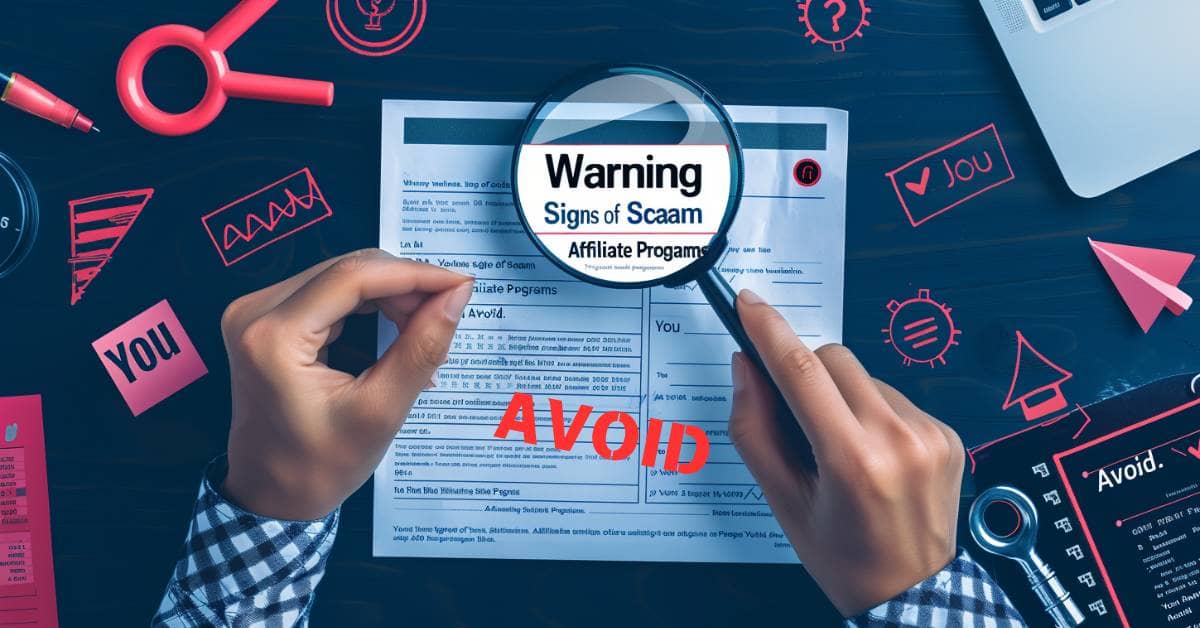Spotting Scam Affiliate Programs: Key Warning Signs to Avoid Getting Burned!
Affiliate marketing is one of the most lucrative ways to make money online. However, not every opportunity is as it seems. Scam affiliate programs are lurking around every corner, waiting to take advantage of unsuspecting marketers. In this blog post, we’ll reveal the critical warning signs of scam affiliate programs. By the end, you’ll be armed with the knowledge to avoid these traps and succeed in your affiliate marketing journey.
Table of Contents:
- Why Scam Affiliate Programs Exist
- Red Flags of Scam Programs
- Investigating Affiliate Programs
- Protecting Yourself from Scams
- Actions to Take if Scammed
- Final Thoughts
1. Understanding the Risks: Why Scam Affiliate Programs Exist
Affiliate marketing is expanding at an incredible pace. Unfortunately, this rapid growth has also led to the rise of scam affiliate programs. These scams prey on both beginners and seasoned marketers, offering empty promises and delivering nothing of value. Scammers are often driven by the desire to make a quick profit by exploiting those eager to succeed in the affiliate marketing world.
Scam affiliate programs are designed to lure you in with flashy promises. They might tempt you with sky-high commissions, guaranteed results, or the promise of a luxurious lifestyle with minimal effort. But remember, if it sounds too good to be true, it probably is. These programs can tarnish your reputation, waste your time, and, most importantly, drain your bank account.
Common Tactics Used by Scammers:
- Promises of unrealistic earnings with minimal effort.
- High-pressure sales tactics to push you into quick decisions.
- Lack of transparency about the company and its owners.
To protect yourself, it’s crucial to recognize the red flags that indicate a scam affiliate program. If you’re interested in learning more about avoiding online scams, you might find our recent post, Cryptocurrency Scams Exposed: Unveiling the Dark Side, particularly insightful.
2. Top Red Flags of Scam Affiliate Programs
Spotting a scam affiliate program before getting involved is key to protecting your time and money. Here are some top red flags to watch out for:
Unrealistic Earning Promises:
One of the most common red flags is the promise of high earnings with little to no effort. Legitimate affiliate programs understand that building a successful affiliate business takes time and effort. If a program claims you’ll be making thousands of dollars in your first week with minimal work, it’s likely a scam.
Lack of Clear Information About the Program:
Transparency is crucial. If an affiliate program doesn’t provide clear information about how it operates, who runs it, and how commissions are earned, that’s a major warning sign. Scam affiliate programs often hide behind vague descriptions or complex jargon to confuse and deceive potential affiliates.
High Upfront Fees or Mandatory Purchases:
While some legitimate programs may require a small fee to access certain resources, scam affiliate programs will often ask for large upfront payments. They might also require you to purchase expensive products before you can start earning. Be wary of any program that demands significant financial investment before proving its legitimacy.
Pressure Tactics and Aggressive Recruitment:
Scammers often use high-pressure sales tactics to rush you into making decisions. They may claim that spots are limited or that you need to act fast to secure your place. Legitimate programs don’t pressure potential affiliates to join.
No Verifiable Reviews or Negative Online Feedback:
Before joining any affiliate program, always check for reviews and feedback online. Scam affiliate programs often have little to no verifiable reviews. If you find overwhelmingly negative feedback, especially from trusted sources, it’s best to steer clear.
3. How to Investigate an Affiliate Program Before Joining
Before committing to any affiliate program, it’s crucial to do your homework. Here’s how you can investigate and determine whether a program is legitimate or a scam:
Research the Company’s History and Ownership:
Look into the background of the company. Who owns it? How long has it been in operation? A quick online search can reveal a lot about the credibility of the program. Scam affiliate programs often have unclear or non-existent histories.
Check for Transparent Payment Structures and Terms:
Legitimate affiliate programs clearly outline how and when you’ll be paid. If a program is vague about its payment terms or requires you to reach an unusually high threshold before payouts, be cautious.
Analyze Online Reviews and Ratings from Trusted Sources:
Read reviews from other affiliates who have participated in the program. Trusted review sites and forums can provide insights into the experiences of others. If you find numerous complaints or reports of non-payment, avoid the program.
Seek Out Feedback from Experienced Affiliate Marketers:
Connecting with seasoned affiliate marketers can be invaluable. They can provide insights into the legitimacy of different programs. Many scammers target beginners, so it’s beneficial to learn from those with more experience.
Verify the Program’s Legitimacy Through Official Channels:
Check if the affiliate program is registered with any recognized organizations or has any certifications. Official channels like the Better Business Bureau (BBB) or other regulatory bodies can provide information on the program’s standing.
4. Protecting Yourself from Scam Affiliate Programs
Even with the best research, you might still encounter scam affiliate programs. Here are some proactive steps you can take to protect yourself:
Establish a Due Diligence Checklist Before Joining Any Program:
Create a checklist of questions and criteria that any affiliate program must meet before you consider joining. This could include aspects like transparency, payment terms, and the presence of verifiable reviews.
Set Up Financial Protections and Keep Detailed Records:
Keep records of all communications, agreements, and transactions related to the affiliate program. This documentation can be crucial if you need to take legal action. Additionally, consider using secure payment methods that offer buyer protection.
Use Reputable Affiliate Networks as a Safeguard:
Affiliate networks like ShareASale or CJ Affiliate vet the programs they list, providing an additional layer of security. These networks can help reduce the risk of encountering scams.
Educate Yourself on Common Scam Tactics and Stay Updated:
Scammers are always coming up with new ways to deceive. Stay informed about the latest scam tactics by following industry news and joining affiliate marketing communities.
Build a Network of Trustworthy Affiliate Partners:
Surround yourself with a network of trusted affiliates. By collaborating and sharing information, you can help protect each other from potential scams.
5. What to Do If You’ve Been Scammed
If you find yourself the victim of a scam affiliate program, it’s important to act quickly:
Steps to Take Immediately After Discovering a Scam:
- Stop all communications with the scammer.
- Report the scam to the relevant authorities and platforms.
- Notify your financial institutions if any financial transactions were involved.
How to Report the Scam to Relevant Authorities and Platforms:
Report the scam to platforms like the Federal Trade Commission (FTC) or the Better Business Bureau (BBB). Additionally, inform the affiliate network if the scam is associated with one.
Recovering Your Financial Losses and Protecting Your Identity:
If possible, try to recover your funds through chargebacks or dispute processes with your bank or payment provider. Monitor your credit report and bank statements to protect against identity theft.
Learning from the Experience to Prevent Future Scams:
Use the experience as a learning opportunity. Share your story with others to help them avoid similar situations.
Sharing Your Story to Help Others Avoid Similar Traps:
Write a blog post or participate in online forums to warn others about the scam. Your experience could save someone else from falling into the same trap.
Final Thoughts and Staying Scam-Free
Scam affiliate programs can be devastating, but thankfully, they are rare. With the right knowledge, you can easily protect yourself from becoming a victim. By staying vigilant and recognizing the warning signs, you can avoid these traps and focus on legitimate opportunities that will help you grow your affiliate marketing business. Remember, if something seems too good to be true, it probably is. Stay informed and keep thriving on your affiliate marketing journey!
I’ve been in and out of the affiliate marketing business for over 25 years. Why in and out? Well, I’ve explored other business ventures, which has been an incredible journey. But through all my experiences, one truth stands out: affiliate marketing, especially through a personal brand, is absolutely the best business model out there. Here’s why:
- Low Startup Costs: You can get started with minimal investment.
- Scalability: There’s virtually no limit to how much you can earn.
- Flexibility: Work from anywhere, on your own schedule.
- Passive Income: Build systems that earn money even while you sleep.
- Diverse Income Streams: Promote multiple products and niches.
- Building Trust: A personal brand creates strong, loyal audiences.
🚀 Want to fast-track your success in the exciting world of affiliate marketing? Ready to take the next step?
Watch this 7-minute video that could change your life—it’s 100% free to take a look.
This program has been my go-to for the past 6 years, and it’s hands down the best affiliate coaching program for beginners.
Don’t miss out on this incredible opportunity! Get started today



